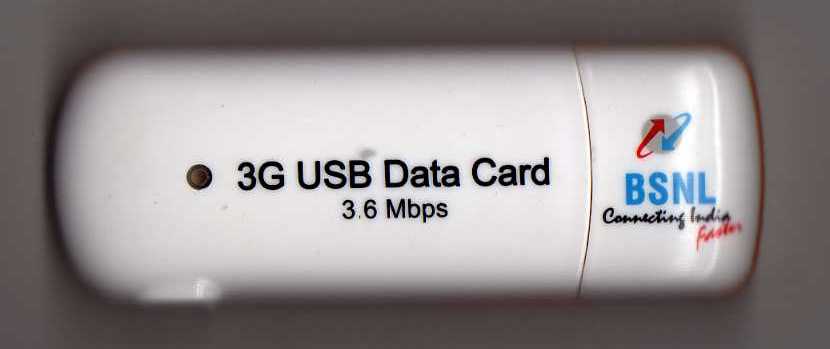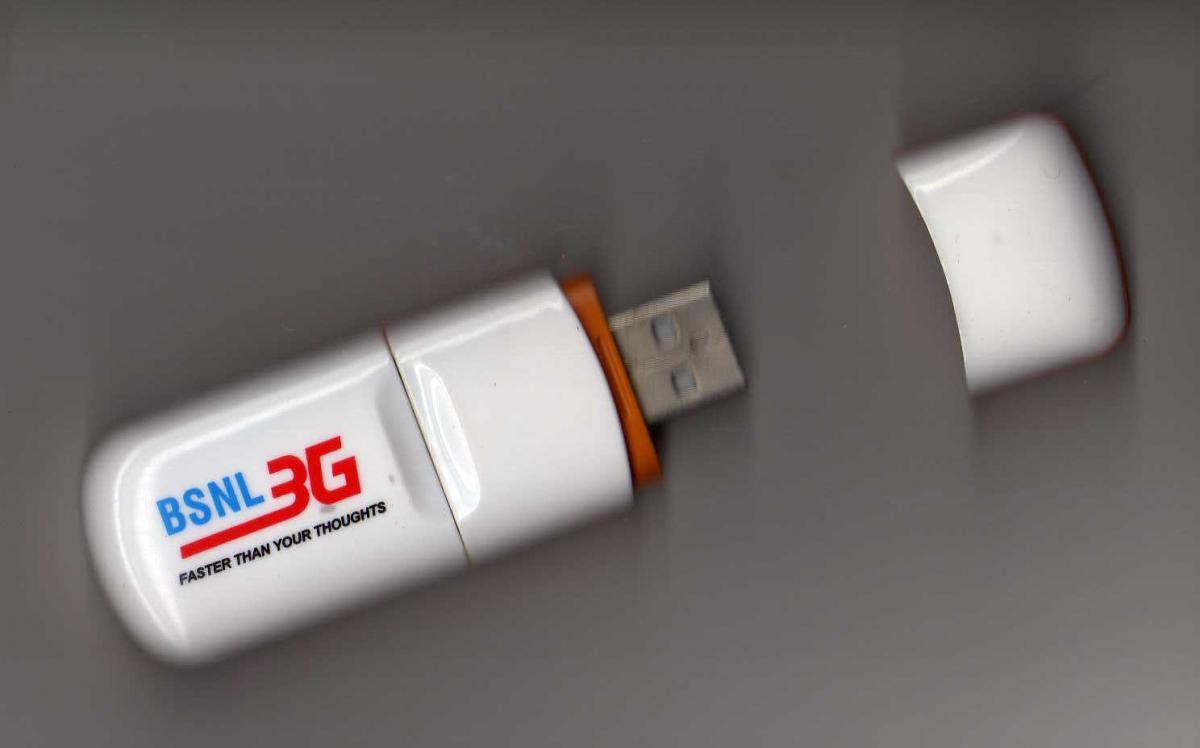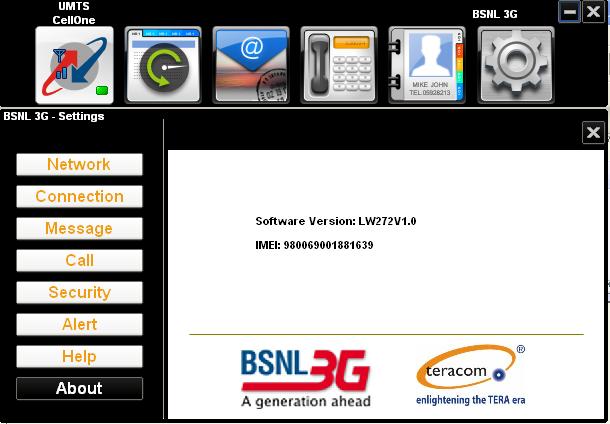A QUICK-HOWTO: How to setup / configure the Teracom LW272 BSNL 3G USB Data Card (Modem) on Ubuntu 10.04 Lucid Lynx / Ubuntu 10.10 Maverick Meerkat
The latest Teracom LW272 3.6 Mbps 3G USB Data Card distributed by BSNL deserves some good comments for even the slightest efforts they have put, in bundling a Linux dialler application along with the Windows version.
But, maybe due to their ignorance, the dialler application is not quite effective in bringing even the most basic functionality expected - the 3G modem functionality, on today's versions of Ubuntu (10.04, 10.10).


The device features an automatic internal USB mode-switching implementation, which helps it to emulate 3 USB devices instead of one -

-
a virtual USB CD Drive with a virtual CD containing the drivers,
- autoruns the driver installation when the device is plugged in for the first time
- a pretty useful feature on Windows, that you wont have to physically carry around any driver CD, -
a mass storage device
- for the memory card slot beneath the SIM card slot, - and the 3G modem device.
The problem is that hardly anything of this kind of functionality is properly documented for the creation of linux drivers.
Anyway, after some research and much experimenting, I got my device working as a 3G modem on my Ubuntu 10.04 with the help of Joshua Dietze's usb_modeswitch (usb_modeswitch is a simple but very useful linux script for switching the modes of such composite usb devices).
I list down the consolidated steps so that you too can benefit from what I have learnt. :-)
(Perhaps, a one-click script would be a more elegant solution. Till I get the time to write the script, you may use the following steps to get things going).
NOTE OF CAUTION:
-
These steps are exactly applicable only to the following Data Card model:
-
3G USB Data Card 3.6Mbps - Teracom LW272
-
-
I will publish a more detailed and generic set of steps applicable for all similar devices, in a later post.
-
IF YOU FACE ANY DIFFICULTIES USING THIS METHOD TO GET YOUR DEVICE WORKING,
DO LET ME KNOW - use the 'comments' link below - I'LL TRY MY BEST TO HELP YOU OUT.
STEPS:
(You may find it easier to 'copy-paste' the shell commands, to avoid typing mistakes).
STEP 01: Plug in the modem.
STEP 02: Verify that the device is exactly the same one as described here:
Issue the following command at the Terminal ('copy-paste'/type, press ENTER key):
echo $(lsusb | grep '19d2') | cut -c21-
You should see something like
this:
Bus 001 Device 004: ID 19d2:0108 ONDA Communication S.p.A.
or this:
Bus 001 Device 004: ID 19d2:2000 ONDA Communication S.p.A.
If not,
Your device seems to be different than what is described here. These settings might not work.
STOP.
If you see something similar,
You may proceed safely.
STEP 03: Install usb-modeswitch,
by issuing the following command at the Terminal:
sudo apt-get install usb-modeswitch
STEP 04: Add the modeswitch rules for the device in the rules configuration file as follows:
In Terminal, type
sudo gedit /lib/udev/rules.d/40-usb_modeswitch.rules
In the file that we now opened in gedit,
below the line that says
LABEL="modeswitch_rules_begin"
add the following:
#TERACOM LW272 USB 3G MODEM
ATTRS{idVendor}=="19d2", ATTRS{idProduct}=="0108", RUN+="usb_modeswitch '%b/%k'"
ATTRS{idVendor}=="19d2", ATTRS{idProduct}=="2000", RUN+="usb_modeswitch '%b/%k'"
Save and exit the text editor.
STEP 05: Add the modeswitch control configuration for the first device id, as follows:
First, make a copy of an existing control configuration.
sudo cp /etc/usb_modeswitch.d/1c9e\:9200 /etc/usb_modeswitch.d/19d2\:0108
Then, edit these to suit our device:
sudo gedit /etc/usb_modeswitch.d/19d2\:0108
In the file just opened, change the following:
1. Name of the device in the title comments.
Change to
# TERACOM LW272 USB 3G MODEM
2. DefaultVendor
Change to
DefaultVendor= 0x19d2
3. DefaultProduct
Change to
DefaultProduct=0x0108
4. TargetVendor
Change to
TargetVendor= 0x19d2
5. TargetProduct
Change to
TargetProduct= 0x0108
Save and exit.
STEP 06: Next, create the modeswitch control configuration for the second device id:
Make a copy of the first device's control configuration file
sudo cp /etc/usb_modeswitch.d/19d2\:0108 /etc/usb_modeswitch.d/19d2\:2000
Edit the file
sudo gedit /etc/usb_modeswitch.d/19d2\:2000
and make the following changes:
1. DefaultProduct
Change to
DefaultProduct=0x2000
2. TargetProduct
Change to
TargetProduct= 0x2000
Save and exit.
STEP 07: Insert the usbserial module as follows:
Open up the following file:
sudo gedit /etc/modules
and add the following lines at the end of the file:
usbserial vendor=0x19d2 product=0x0108
usbserial vendor=0x19d2 product=0x2000
Save, exit.
STEP 08: Remove device from USB port.
STEP 09: Restart the PC.
The DEVICE CONFIGURATION IS OVER.
Now, to set up the new connection for BSNL 3G Service, follow these additional steps:
STEP 10: After logging in, Plug in the device in the USB port, and WAIT for some time (around 10 to 20 seconds).
STEP 11: Now click the NetworkManager Applet on the top panel.
A list of available connections will appear.
Among these, there should be something like this:
New Mobile Broadband (GSM) connection...
Click on that.
The New Mobile Broadband Connection Wizard will appear.
Click the "Forward" button.
Select "India" from the list of countries.
Click "Forward".
Select "BSNL/Cellone" from the list of providers.
Click "Forward".
From the "Select your Plan" dropdown, select your plan from the list.
If not present,
Select the last option "My plan is not listed...".
Now in the "Selected Plan APN (Access Point Name)" textbox, enter your APN.
Note: If unsure about your plan's APN,
Please confirm the correct APN, for your plan and area, with BSNL Customer Care.
For me, (at Thiruvananthapuram, Kerala), the APN was
bsnlnet
Click "Forward".
Click "Apply".
Wait and behold, you should see the long awaited "Connected" notification! :-)
REFERENCES:
http://www.draisberghof.de/usb_modeswitch
http://sakis.tel4u.gr/blog/sakis3g/
http://duopetalflower.blogspot.com/2010/05/configuring-bsnl-evdo-capitel-3g-usb.html
- 541259 reads



Comments
admin
Sat, 12/04/2010 - 04:26
Permalink
Request for help - ramakrishna
ramakrishna sent a message using the contact form at http://antojose.com/contact.
Dear Sir,
i have a BSNL 3g data card + asus eee pc 1000 h.
I am planning to install Easy Peasy - 1.6 Linux (http://www.geteasypeasy.com/get-easypeasy) on my computer.
I read your how to document mentioned below, Would this procedure work on the above mentioned Hardware/OS?
I am just trying to download everything that is required, I might seek your help if required, I will update you the status how its going on in a day or two.
thanks,
ramakrishna
anto
Sat, 12/04/2010 - 07:06
Permalink
Re: Request for help - ramakrishna
Ramkrishna,
I just checked out the specs of EasyPeasy 1.6.
This procedure should work identically for EasyPeasy since it is completely based on Ubuntu Netbook Remix.
Let me know if you face any difficulty. I'll try my best to help you out.
Cheers,
Anto Jose
Anonymous (not verified)
Sat, 12/04/2010 - 16:44
Permalink
success in configuring bsnl 3g modem
Dear Sir,
I installed EasyPeasy 1.6 and when I plugged in the BSNL 3G Teracom LW272 then it showed up a window in which there are Driver/Setup files of the modem for all Linux, Windows, Mac. BSNL has already supplied all the necessary driver/setup files within their modem itself. No need to use anything from outside.
I opened and browsed to Linux folder in the BSNL 3G Modem drive, there I was able to see a debian setup file, I ran it and it installed everything like how it installs automatically in windows xp. I connected and using the internet. It's just plug and play. Everything is already there(supplied).
I remember you saying your post that what is being supplied by BSNL is not optimized and it's just a basic feature, then I tried to follow the procedure and tried to install usb-modeswitch.
I tried to download usb-modeswitch as it's not supplied in easypeasy, as it was a source file, i then had to download the necessary C compiler and library files in this regard I downloaded EeePC-SDK-2008.04.24_19.46.iso from sourceforge (the SDK supplied by asus) unfortunately it's not working and installing.
Then I downloaded Build essentials and installed directly from internet, even then the compilation is not working, I think there is something wrong in getting the right c compilers and all it's dependant library files.
I have to install C compilers and necessary libraries, Is there any why I could download the necessary C compilers and library files? As easypeasy is another form of Ubuntu, can I download a ubuntu C compiler and library package directly from it's website will it work? please guide me in this regard
ramakrishna
[email address not displayed]
anto
Mon, 12/06/2010 - 05:53
Permalink
Ramakrishna, It is well and
Ramakrishna,
It is well and fortunate if the supplied deb is working fine. :-)
This method is to be followed in case the deb file doesnt seem to work.
Still, if you would like to tinker around, send me the error log.
Cheers,
Anto
Anonymous (not verified)
Sat, 12/04/2010 - 12:57
Permalink
help needed Bijo Paul (Tvm)
dear sir
i tried this method to install my 3g card on ubuntu 10.10 desktop edition. Followed the steps word by word. but on inserting the usb green light comes and goes first. Again the same thing happens after which the applet shows the BSNL 3g in broadband group. On connecting the same a notification comes saying you are offline and then all the lights on card goes off. Then nothing.
other details regarding APN and account are correct
please help.
i am new on linux and ubuntu. Mine is a lenovo laptop.
[email address not displayed]
anto
Mon, 12/06/2010 - 05:45
Permalink
Could you send me the log of
Could you send me the log of lsusb?
Anonymous (not verified)
Wed, 12/08/2010 - 23:15
Permalink
log of lsusb
Dear sir,
please advice me how to find it. I am totally new to linux.
And i just ran the command lsusb in terminal and following details were shown.
adding it .
Bus 007 Device 001: ID 1d6b:0001 Linux Foundation 1.1 root hub
Bus 006 Device 001: ID 1d6b:0001 Linux Foundation 1.1 root hub
Bus 005 Device 001: ID 1d6b:0001 Linux Foundation 1.1 root hub
Bus 004 Device 001: ID 1d6b:0001 Linux Foundation 1.1 root hub
Bus 003 Device 002: ID 15d9:0a4c Trust International B.V.
Bus 003 Device 001: ID 1d6b:0001 Linux Foundation 1.1 root hub
Bus 002 Device 009: ID 19d2:0108 ONDA Communication S.p.A.
Bus 002 Device 002: ID 0bc2:2101 Seagate RSS LLC
Bus 002 Device 001: ID 1d6b:0002 Linux Foundation 2.0 root hub
Bus 001 Device 003: ID 0bda:0158 Realtek Semiconductor Corp. USB 2.0 multicard reader
Bus 001 Device 001: ID 1d6b:0002 Linux Foundation 2.0 root hub
thank you for your reply
with regards
Bijo Paul
Anonymous (not verified)
Wed, 12/08/2010 - 23:25
Permalink
help needed really Bijo Paul
Dear sir,
i am adding the log of usb hoping this will be it.
Bus 007 Device 001: ID 1d6b:0001 Linux Foundation 1.1 root hub
Device Descriptor:
bLength 18
bDescriptorType 1
bcdUSB 1.10
bDeviceClass 9 Hub
bDeviceSubClass 0 Unused
bDeviceProtocol 0 Full speed (or root) hub
bMaxPacketSize0 64
idVendor 0x1d6b Linux Foundation
idProduct 0x0001 1.1 root hub
bcdDevice 2.06
iManufacturer 3
iProduct 2
iSerial 1
bNumConfigurations 1
Configuration Descriptor:
bLength 9
bDescriptorType 2
wTotalLength 25
bNumInterfaces 1
bConfigurationValue 1
iConfiguration 0
bmAttributes 0xe0
Self Powered
Remote Wakeup
MaxPower 0mA
Interface Descriptor:
bLength 9
bDescriptorType 4
bInterfaceNumber 0
bAlternateSetting 0
bNumEndpoints 1
bInterfaceClass 9 Hub
bInterfaceSubClass 0 Unused
bInterfaceProtocol 0 Full speed (or root) hub
iInterface 0
Endpoint Descriptor:
bLength 7
bDescriptorType 5
bEndpointAddress 0x81 EP 1 IN
bmAttributes 3
Transfer Type Interrupt
Synch Type None
Usage Type Data
wMaxPacketSize 0x0002 1x 2 bytes
bInterval 255
Bus 006 Device 001: ID 1d6b:0001 Linux Foundation 1.1 root hub
Device Descriptor:
bLength 18
bDescriptorType 1
bcdUSB 1.10
bDeviceClass 9 Hub
bDeviceSubClass 0 Unused
bDeviceProtocol 0 Full speed (or root) hub
bMaxPacketSize0 64
idVendor 0x1d6b Linux Foundation
idProduct 0x0001 1.1 root hub
bcdDevice 2.06
iManufacturer 3
iProduct 2
iSerial 1
bNumConfigurations 1
Configuration Descriptor:
bLength 9
bDescriptorType 2
wTotalLength 25
bNumInterfaces 1
bConfigurationValue 1
iConfiguration 0
bmAttributes 0xe0
Self Powered
Remote Wakeup
MaxPower 0mA
Interface Descriptor:
bLength 9
bDescriptorType 4
bInterfaceNumber 0
bAlternateSetting 0
bNumEndpoints 1
bInterfaceClass 9 Hub
bInterfaceSubClass 0 Unused
bInterfaceProtocol 0 Full speed (or root) hub
iInterface 0
Endpoint Descriptor:
bLength 7
bDescriptorType 5
bEndpointAddress 0x81 EP 1 IN
bmAttributes 3
Transfer Type Interrupt
Synch Type None
Usage Type Data
wMaxPacketSize 0x0002 1x 2 bytes
bInterval 255
Bus 005 Device 001: ID 1d6b:0001 Linux Foundation 1.1 root hub
Device Descriptor:
bLength 18
bDescriptorType 1
bcdUSB 1.10
bDeviceClass 9 Hub
bDeviceSubClass 0 Unused
bDeviceProtocol 0 Full speed (or root) hub
bMaxPacketSize0 64
idVendor 0x1d6b Linux Foundation
idProduct 0x0001 1.1 root hub
bcdDevice 2.06
iManufacturer 3
iProduct 2
iSerial 1
bNumConfigurations 1
Configuration Descriptor:
bLength 9
bDescriptorType 2
wTotalLength 25
bNumInterfaces 1
bConfigurationValue 1
iConfiguration 0
bmAttributes 0xe0
Self Powered
Remote Wakeup
MaxPower 0mA
Interface Descriptor:
bLength 9
bDescriptorType 4
bInterfaceNumber 0
bAlternateSetting 0
bNumEndpoints 1
bInterfaceClass 9 Hub
bInterfaceSubClass 0 Unused
bInterfaceProtocol 0 Full speed (or root) hub
iInterface 0
Endpoint Descriptor:
bLength 7
bDescriptorType 5
bEndpointAddress 0x81 EP 1 IN
bmAttributes 3
Transfer Type Interrupt
Synch Type None
Usage Type Data
wMaxPacketSize 0x0002 1x 2 bytes
bInterval 255
Bus 004 Device 001: ID 1d6b:0001 Linux Foundation 1.1 root hub
Device Descriptor:
bLength 18
bDescriptorType 1
bcdUSB 1.10
bDeviceClass 9 Hub
bDeviceSubClass 0 Unused
bDeviceProtocol 0 Full speed (or root) hub
bMaxPacketSize0 64
idVendor 0x1d6b Linux Foundation
idProduct 0x0001 1.1 root hub
bcdDevice 2.06
iManufacturer 3
iProduct 2
iSerial 1
bNumConfigurations 1
Configuration Descriptor:
bLength 9
bDescriptorType 2
wTotalLength 25
bNumInterfaces 1
bConfigurationValue 1
iConfiguration 0
bmAttributes 0xe0
Self Powered
Remote Wakeup
MaxPower 0mA
Interface Descriptor:
bLength 9
bDescriptorType 4
bInterfaceNumber 0
bAlternateSetting 0
bNumEndpoints 1
bInterfaceClass 9 Hub
bInterfaceSubClass 0 Unused
bInterfaceProtocol 0 Full speed (or root) hub
iInterface 0
Endpoint Descriptor:
bLength 7
bDescriptorType 5
bEndpointAddress 0x81 EP 1 IN
bmAttributes 3
Transfer Type Interrupt
Synch Type None
Usage Type Data
wMaxPacketSize 0x0002 1x 2 bytes
bInterval 255
Bus 003 Device 002: ID 15d9:0a4c Trust International B.V.
Device Descriptor:
bLength 18
bDescriptorType 1
bcdUSB 1.10
bDeviceClass 0 (Defined at Interface level)
bDeviceSubClass 0
bDeviceProtocol 0
bMaxPacketSize0 8
idVendor 0x15d9 Trust International B.V.
idProduct 0x0a4c
bcdDevice 1.00
iManufacturer 0
iProduct 1
iSerial 0
bNumConfigurations 1
Configuration Descriptor:
bLength 9
bDescriptorType 2
wTotalLength 34
bNumInterfaces 1
bConfigurationValue 1
iConfiguration 0
bmAttributes 0xa0
(Bus Powered)
Remote Wakeup
MaxPower 100mA
Interface Descriptor:
bLength 9
bDescriptorType 4
bInterfaceNumber 0
bAlternateSetting 0
bNumEndpoints 1
bInterfaceClass 3 Human Interface Device
bInterfaceSubClass 1 Boot Interface Subclass
bInterfaceProtocol 2 Mouse
iInterface 0
HID Device Descriptor:
bLength 9
bDescriptorType 33
bcdHID 1.11
bCountryCode 0 Not supported
bNumDescriptors 1
bDescriptorType 34 Report
wDescriptorLength 64
Report Descriptors:
** UNAVAILABLE **
Endpoint Descriptor:
bLength 7
bDescriptorType 5
bEndpointAddress 0x81 EP 1 IN
bmAttributes 3
Transfer Type Interrupt
Synch Type None
Usage Type Data
wMaxPacketSize 0x0005 1x 5 bytes
bInterval 10
Bus 003 Device 001: ID 1d6b:0001 Linux Foundation 1.1 root hub
Device Descriptor:
bLength 18
bDescriptorType 1
bcdUSB 1.10
bDeviceClass 9 Hub
bDeviceSubClass 0 Unused
bDeviceProtocol 0 Full speed (or root) hub
bMaxPacketSize0 64
idVendor 0x1d6b Linux Foundation
idProduct 0x0001 1.1 root hub
bcdDevice 2.06
iManufacturer 3
iProduct 2
iSerial 1
bNumConfigurations 1
Configuration Descriptor:
bLength 9
bDescriptorType 2
wTotalLength 25
bNumInterfaces 1
bConfigurationValue 1
iConfiguration 0
bmAttributes 0xe0
Self Powered
Remote Wakeup
MaxPower 0mA
Interface Descriptor:
bLength 9
bDescriptorType 4
bInterfaceNumber 0
bAlternateSetting 0
bNumEndpoints 1
bInterfaceClass 9 Hub
bInterfaceSubClass 0 Unused
bInterfaceProtocol 0 Full speed (or root) hub
iInterface 0
Endpoint Descriptor:
bLength 7
bDescriptorType 5
bEndpointAddress 0x81 EP 1 IN
bmAttributes 3
Transfer Type Interrupt
Synch Type None
Usage Type Data
wMaxPacketSize 0x0002 1x 2 bytes
bInterval 255
Bus 002 Device 015: ID 19d2:0108 ONDA Communication S.p.A.
Device Descriptor:
bLength 18
bDescriptorType 1
bcdUSB 2.00
bDeviceClass 0 (Defined at Interface level)
bDeviceSubClass 0
bDeviceProtocol 0
bMaxPacketSize0 64
idVendor 0x19d2 ONDA Communication S.p.A.
idProduct 0x0108
bcdDevice 0.00
iManufacturer 3
iProduct 2
iSerial 4
bNumConfigurations 1
Configuration Descriptor:
bLength 9
bDescriptorType 2
wTotalLength 131
bNumInterfaces 5
bConfigurationValue 1
iConfiguration 1
bmAttributes 0xe0
Self Powered
Remote Wakeup
MaxPower 500mA
Interface Descriptor:
bLength 9
bDescriptorType 4
bInterfaceNumber 0
bAlternateSetting 0
bNumEndpoints 2
bInterfaceClass 255 Vendor Specific Class
bInterfaceSubClass 255 Vendor Specific Subclass
bInterfaceProtocol 255 Vendor Specific Protocol
iInterface 0
Endpoint Descriptor:
bLength 7
bDescriptorType 5
bEndpointAddress 0x81 EP 1 IN
bmAttributes 2
Transfer Type Bulk
Synch Type None
Usage Type Data
wMaxPacketSize 0x0200 1x 512 bytes
bInterval 32
Endpoint Descriptor:
bLength 7
bDescriptorType 5
bEndpointAddress 0x01 EP 1 OUT
bmAttributes 2
Transfer Type Bulk
Synch Type None
Usage Type Data
wMaxPacketSize 0x0200 1x 512 bytes
bInterval 32
Interface Descriptor:
bLength 9
bDescriptorType 4
bInterfaceNumber 1
bAlternateSetting 0
bNumEndpoints 2
bInterfaceClass 255 Vendor Specific Class
bInterfaceSubClass 255 Vendor Specific Subclass
bInterfaceProtocol 255 Vendor Specific Protocol
iInterface 0
Endpoint Descriptor:
bLength 7
bDescriptorType 5
bEndpointAddress 0x82 EP 2 IN
bmAttributes 2
Transfer Type Bulk
Synch Type None
Usage Type Data
wMaxPacketSize 0x0200 1x 512 bytes
bInterval 32
Endpoint Descriptor:
bLength 7
bDescriptorType 5
bEndpointAddress 0x02 EP 2 OUT
bmAttributes 2
Transfer Type Bulk
Synch Type None
Usage Type Data
wMaxPacketSize 0x0200 1x 512 bytes
bInterval 32
Interface Descriptor:
bLength 9
bDescriptorType 4
bInterfaceNumber 2
bAlternateSetting 0
bNumEndpoints 2
bInterfaceClass 255 Vendor Specific Class
bInterfaceSubClass 255 Vendor Specific Subclass
bInterfaceProtocol 255 Vendor Specific Protocol
iInterface 0
Endpoint Descriptor:
bLength 7
bDescriptorType 5
bEndpointAddress 0x83 EP 3 IN
bmAttributes 2
Transfer Type Bulk
Synch Type None
Usage Type Data
wMaxPacketSize 0x0200 1x 512 bytes
bInterval 32
Endpoint Descriptor:
bLength 7
bDescriptorType 5
bEndpointAddress 0x03 EP 3 OUT
bmAttributes 2
Transfer Type Bulk
Synch Type None
Usage Type Data
wMaxPacketSize 0x0200 1x 512 bytes
bInterval 32
Interface Descriptor:
bLength 9
bDescriptorType 4
bInterfaceNumber 3
bAlternateSetting 0
bNumEndpoints 3
bInterfaceClass 255 Vendor Specific Class
bInterfaceSubClass 255 Vendor Specific Subclass
bInterfaceProtocol 255 Vendor Specific Protocol
iInterface 0
Endpoint Descriptor:
bLength 7
bDescriptorType 5
bEndpointAddress 0x84 EP 4 IN
bmAttributes 3
Transfer Type Interrupt
Synch Type None
Usage Type Data
wMaxPacketSize 0x0040 1x 64 bytes
bInterval 5
Endpoint Descriptor:
bLength 7
bDescriptorType 5
bEndpointAddress 0x85 EP 5 IN
bmAttributes 2
Transfer Type Bulk
Synch Type None
Usage Type Data
wMaxPacketSize 0x0200 1x 512 bytes
bInterval 32
Endpoint Descriptor:
bLength 7
bDescriptorType 5
bEndpointAddress 0x04 EP 4 OUT
bmAttributes 2
Transfer Type Bulk
Synch Type None
Usage Type Data
wMaxPacketSize 0x0200 1x 512 bytes
bInterval 32
Interface Descriptor:
bLength 9
bDescriptorType 4
bInterfaceNumber 4
bAlternateSetting 0
bNumEndpoints 2
bInterfaceClass 8 Mass Storage
bInterfaceSubClass 6 SCSI
bInterfaceProtocol 80 Bulk (Zip)
iInterface 0
Endpoint Descriptor:
bLength 7
bDescriptorType 5
bEndpointAddress 0x05 EP 5 OUT
bmAttributes 2
Transfer Type Bulk
Synch Type None
Usage Type Data
wMaxPacketSize 0x0200 1x 512 bytes
bInterval 0
Endpoint Descriptor:
bLength 7
bDescriptorType 5
bEndpointAddress 0x86 EP 6 IN
bmAttributes 2
Transfer Type Bulk
Synch Type None
Usage Type Data
wMaxPacketSize 0x0200 1x 512 bytes
bInterval 0
Bus 002 Device 002: ID 0bc2:2101 Seagate RSS LLC
Device Descriptor:
bLength 18
bDescriptorType 1
bcdUSB 2.00
bDeviceClass 0 (Defined at Interface level)
bDeviceSubClass 0
bDeviceProtocol 0
bMaxPacketSize0 64
idVendor 0x0bc2 Seagate RSS LLC
idProduct 0x2101
bcdDevice 1.42
iManufacturer 1
iProduct 2
iSerial 3
bNumConfigurations 1
Configuration Descriptor:
bLength 9
bDescriptorType 2
wTotalLength 32
bNumInterfaces 1
bConfigurationValue 1
iConfiguration 0
bmAttributes 0x80
(Bus Powered)
MaxPower 100mA
Interface Descriptor:
bLength 9
bDescriptorType 4
bInterfaceNumber 0
bAlternateSetting 0
bNumEndpoints 2
bInterfaceClass 8 Mass Storage
bInterfaceSubClass 6 SCSI
bInterfaceProtocol 80 Bulk (Zip)
iInterface 0
Endpoint Descriptor:
bLength 7
bDescriptorType 5
bEndpointAddress 0x81 EP 1 IN
bmAttributes 2
Transfer Type Bulk
Synch Type None
Usage Type Data
wMaxPacketSize 0x0200 1x 512 bytes
bInterval 0
Endpoint Descriptor:
bLength 7
bDescriptorType 5
bEndpointAddress 0x02 EP 2 OUT
bmAttributes 2
Transfer Type Bulk
Synch Type None
Usage Type Data
wMaxPacketSize 0x0200 1x 512 bytes
bInterval 0
Bus 002 Device 001: ID 1d6b:0002 Linux Foundation 2.0 root hub
Device Descriptor:
bLength 18
bDescriptorType 1
bcdUSB 2.00
bDeviceClass 9 Hub
bDeviceSubClass 0 Unused
bDeviceProtocol 0 Full speed (or root) hub
bMaxPacketSize0 64
idVendor 0x1d6b Linux Foundation
idProduct 0x0002 2.0 root hub
bcdDevice 2.06
iManufacturer 3
iProduct 2
iSerial 1
bNumConfigurations 1
Configuration Descriptor:
bLength 9
bDescriptorType 2
wTotalLength 25
bNumInterfaces 1
bConfigurationValue 1
iConfiguration 0
bmAttributes 0xe0
Self Powered
Remote Wakeup
MaxPower 0mA
Interface Descriptor:
bLength 9
bDescriptorType 4
bInterfaceNumber 0
bAlternateSetting 0
bNumEndpoints 1
bInterfaceClass 9 Hub
bInterfaceSubClass 0 Unused
bInterfaceProtocol 0 Full speed (or root) hub
iInterface 0
Endpoint Descriptor:
bLength 7
bDescriptorType 5
bEndpointAddress 0x81 EP 1 IN
bmAttributes 3
Transfer Type Interrupt
Synch Type None
Usage Type Data
wMaxPacketSize 0x0004 1x 4 bytes
bInterval 12
Bus 001 Device 003: ID 0bda:0158 Realtek Semiconductor Corp. USB 2.0 multicard reader
Device Descriptor:
bLength 18
bDescriptorType 1
bcdUSB 2.00
bDeviceClass 0 (Defined at Interface level)
bDeviceSubClass 0
bDeviceProtocol 0
bMaxPacketSize0 64
idVendor 0x0bda Realtek Semiconductor Corp.
idProduct 0x0158 USB 2.0 multicard reader
bcdDevice 51.95
iManufacturer 1
iProduct 2
iSerial 3
bNumConfigurations 1
Configuration Descriptor:
bLength 9
bDescriptorType 2
wTotalLength 32
bNumInterfaces 1
bConfigurationValue 1
iConfiguration 4
bmAttributes 0x80
(Bus Powered)
MaxPower 500mA
Interface Descriptor:
bLength 9
bDescriptorType 4
bInterfaceNumber 0
bAlternateSetting 0
bNumEndpoints 2
bInterfaceClass 8 Mass Storage
bInterfaceSubClass 6 SCSI
bInterfaceProtocol 80 Bulk (Zip)
iInterface 5
Endpoint Descriptor:
bLength 7
bDescriptorType 5
bEndpointAddress 0x01 EP 1 OUT
bmAttributes 2
Transfer Type Bulk
Synch Type None
Usage Type Data
wMaxPacketSize 0x0200 1x 512 bytes
bInterval 0
Endpoint Descriptor:
bLength 7
bDescriptorType 5
bEndpointAddress 0x82 EP 2 IN
bmAttributes 2
Transfer Type Bulk
Synch Type None
Usage Type Data
wMaxPacketSize 0x0200 1x 512 bytes
bInterval 0
Bus 001 Device 001: ID 1d6b:0002 Linux Foundation 2.0 root hub
Device Descriptor:
bLength 18
bDescriptorType 1
bcdUSB 2.00
bDeviceClass 9 Hub
bDeviceSubClass 0 Unused
bDeviceProtocol 0 Full speed (or root) hub
bMaxPacketSize0 64
idVendor 0x1d6b Linux Foundation
idProduct 0x0002 2.0 root hub
bcdDevice 2.06
iManufacturer 3
iProduct 2
iSerial 1
bNumConfigurations 1
Configuration Descriptor:
bLength 9
bDescriptorType 2
wTotalLength 25
bNumInterfaces 1
bConfigurationValue 1
iConfiguration 0
bmAttributes 0xe0
Self Powered
Remote Wakeup
MaxPower 0mA
Interface Descriptor:
bLength 9
bDescriptorType 4
bInterfaceNumber 0
bAlternateSetting 0
bNumEndpoints 1
bInterfaceClass 9 Hub
bInterfaceSubClass 0 Unused
bInterfaceProtocol 0 Full speed (or root) hub
iInterface 0
Endpoint Descriptor:
bLength 7
bDescriptorType 5
bEndpointAddress 0x81 EP 1 IN
bmAttributes 3
Transfer Type Interrupt
Synch Type None
Usage Type Data
wMaxPacketSize 0x0004 1x 4 bytes
bInterval 12
on failing our method i tried
http://amit-mendapara.blogspot.com/2010/11/amazing-bsnl-3g.html
in that i ran this command
$ sudo usb_modeswitch -v 230d -p 0001 -u 3
that did not work either.
then i installed your debian package. that went smoothly. showing the interface. but shows no device.
now dont know what to do.forgive the deperation. really ina mess.
technikhil (not verified)
Mon, 04/25/2011 - 16:58
Permalink
I owe you a coffee / juice
Hi,
I was dreading having to muddle my way through setting up my 3G modem and potentially screwing up my Ubuntu 10.10 install on my desktop when I decided to Google Teracom and BSNL. I found the link to your manual setup first (I since saw the .deb you have created) and followed it to the letter. The result is a working 3G connection on which I am writing this comment - thanks a lot for the detailed instructions - I owe you a beer and if you don't drink alcohol, a fruit cocktail. If you are in Trivandrum - drop me an email .
anto
Thu, 10/06/2011 - 09:14
Permalink
a verrrrrryy late reply
technikhil,
Apologies for the late reply. I had the comment pending in my approval queue, and I had not checked my queue for the past 6 months! Really good to hear the post was useful for you.
btw the deb was not created by me. I found it somewhere on the web.
Thanks a lot for the offer anyway!
btw, I happen to be in TVM. ;-)
n Hey, you write real good! (just came across your website)
@ppl, I personally recommend, http://technikhil.wordpress.com/
giri (not verified)
Mon, 07/18/2011 - 20:18
Permalink
installation of bsnl LW272 datacard in fedora14
sir,
i am using fedora14 o.s. and i am new to linux. Can i follow the same procedure to install datacard in fedora14 as you mentioned for ubuntu10.10;
so, please inform me about this problem if there is another procedure in fedora14 could you please share with me. Please mail me its urgent sir
plzzzzzzzzzzz
-Giri
Mohammed Ammeen (not verified)
Sat, 10/15/2011 - 01:46
Permalink
Some issue on installation of BSNL 3G teracom lw272
Hi sir ,
I am using Ubuntu 10.04 lts version which is updated,when i tried with the above mentioned procedure's , but i got struck in the step.4 and step5. the issues are
the file modeswitch is also installed successfully.
1.i count do edit that file , and try to copy it to desktop and edit it and try to replace it that comes to fail
the file and their root
sudo gedit /lib/udev/rules.d/40-usb_modeswitch.rules
sudo cp /etc/usb_modeswitch.d/1c9e\:9200 /etc/usb_modeswitch.d/19d2\:0108
and in the step 5
2.the file name "sudo cp /etc/usb_modeswitch.d/19d2\:0108" doesn't exist
in the above line command "cp" mean (weather a file or command ,if its file its doesn't exist in my file system)
and in the step 5 & 6
which of the file i have to make a edit , please make it clear .....
awaiting for the replay with kind ........
anto
Tue, 11/08/2011 - 07:02
Permalink
You could try upgrading to
You could try upgrading to the latest version of Ubuntu 11.10 or the LTS 11.04 version. These seem to better support the device without much hacking.
Let me know if that doesnt solve the issue.
Mohammed Ammeen (not verified)
Sat, 10/15/2011 - 23:54
Permalink
Hi sir I am mohammed
Hi sir
I am mohammed ammeen i just tried to install the bsnl 3g to my ubuntu 10.04 tls the data card i use id powered by teracom v272 . i had a problem with the steps 4,5&6 , please can u able to make it clear
1.when i try to gedit the file given in the step 4 ,5&6 i could not able to do it ,
2.in the step 5&6 which file i have to edit , can please make it clear
3.and i cloud not open any file using terminal by the command in the step 4,5&6 , i did it manual
all the specification (like usb modeswitch,) files are been properly installed and the whole ubuntu10.04 lts is update till date
and the file 19d2:0108 doesn't exist in my system ......
please help me , with the solution
my mail id is mohammedammeen@gmail.com
awaiting for your replay ,
anto
Thu, 10/20/2011 - 08:56
Permalink
Mohammed, what was the error
Mohammed, what was the error showing up?
SANTOSH SAHA (not verified)
Fri, 11/11/2011 - 13:55
Permalink
To Un-Block my BSNL 3G USB,LW272 ,TERACOM.
SIR IN MY AREA THE BSNL NETWORK IS VERY SLOW ,WHILE I AM NOT ABLE TO DO MY WORK AS EARLIER .
SO I WANT TO UN BLOCK MY DUNGAL.EMI.NO-980069001638609,MODEL NO-LW272,SN NO-392001871403
I WANT TO USE OTHER SIM IN THAT USB PORT .
WHEN I INSERT ANY OTHER NETWORK SIM THAT MAY SOME PROBLEMS LIKE INVALID SIM OR ETC.
SO PLEASE GUIDE ME HOW CAN I DO THAT USE THROUGH OTHER SIM ON LW272.
SIR KINDLY SEND ME A MESSAGE ON MY ID sbpsantoshsaha@gmail.com
I AM WAITING FOR YOUR REPLY.
Anonymous (not verified)
Fri, 12/09/2011 - 19:28
Permalink
Help regarding Visiontek 82GH USB Modem
Hey... I tried the very first step u hav mentioned and hav made sure tat my device is NOT the one foe which instructions are available here... Mine is a VisionTek 82GH 7.2Mbps HSUPA modem.. please help me with using it in my linux Os... thanx in advance
prdp006 (not verified)
Sat, 02/04/2012 - 15:08
Permalink
How to unlock my lw272 ?
Sir,
Am using BSNL lw272 3g data card. In my place BSNL network is very down, i unlocked lw272 and using with other network SIM card in Win 7. Now am wishing to work in linux. Can u please guide me how to unlock in linux? Waiting for your reply...
Add new comment